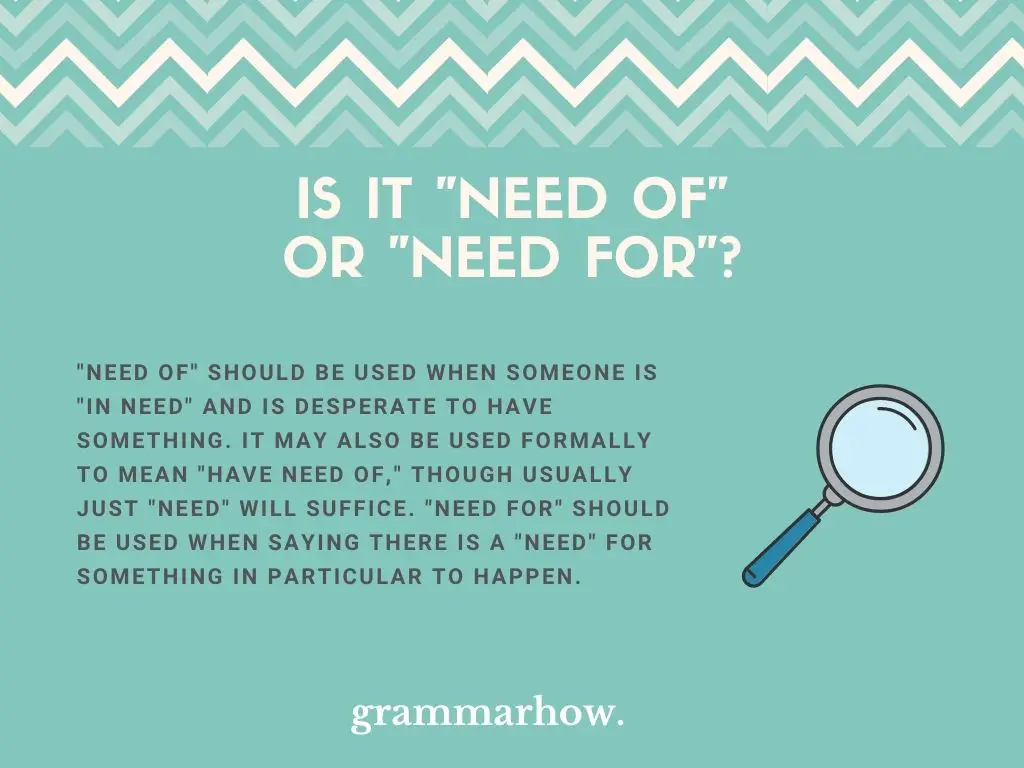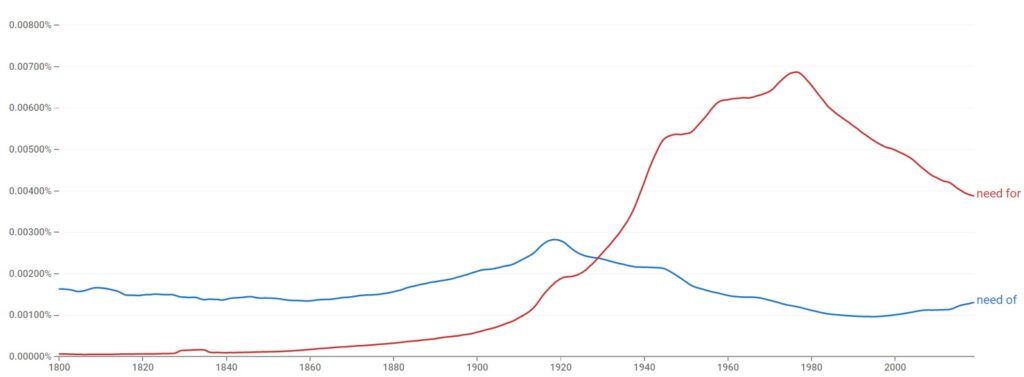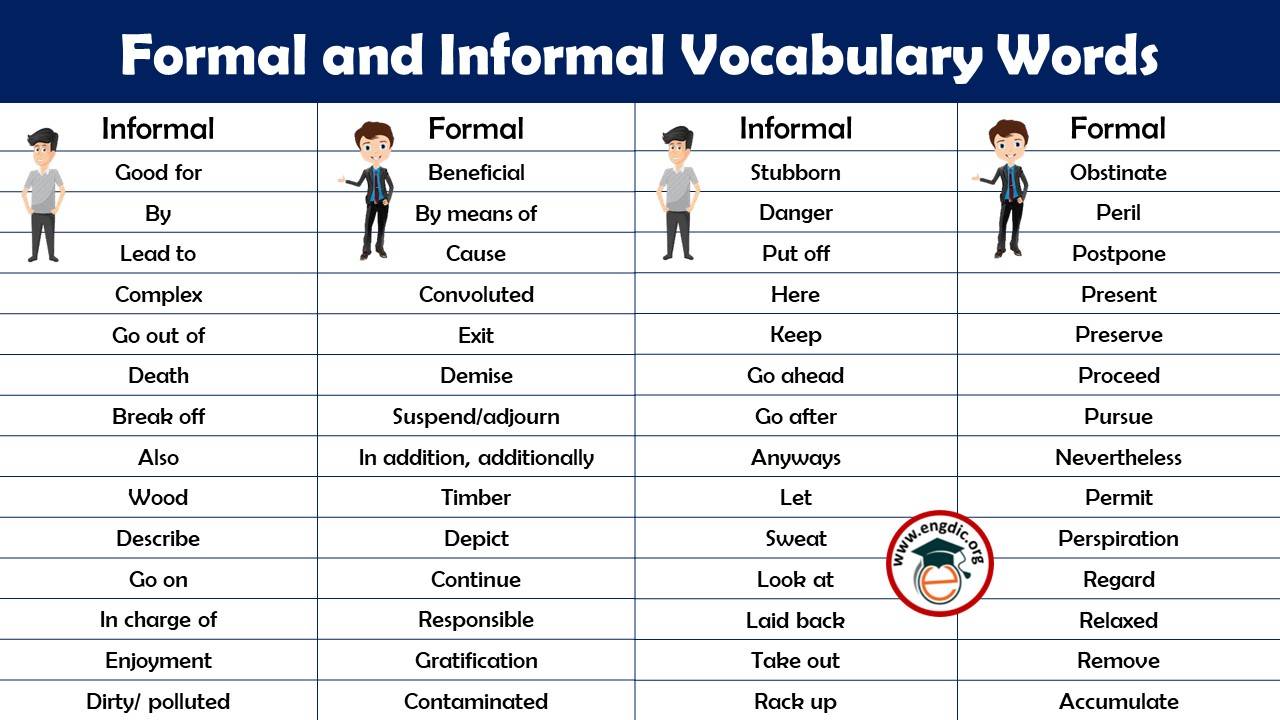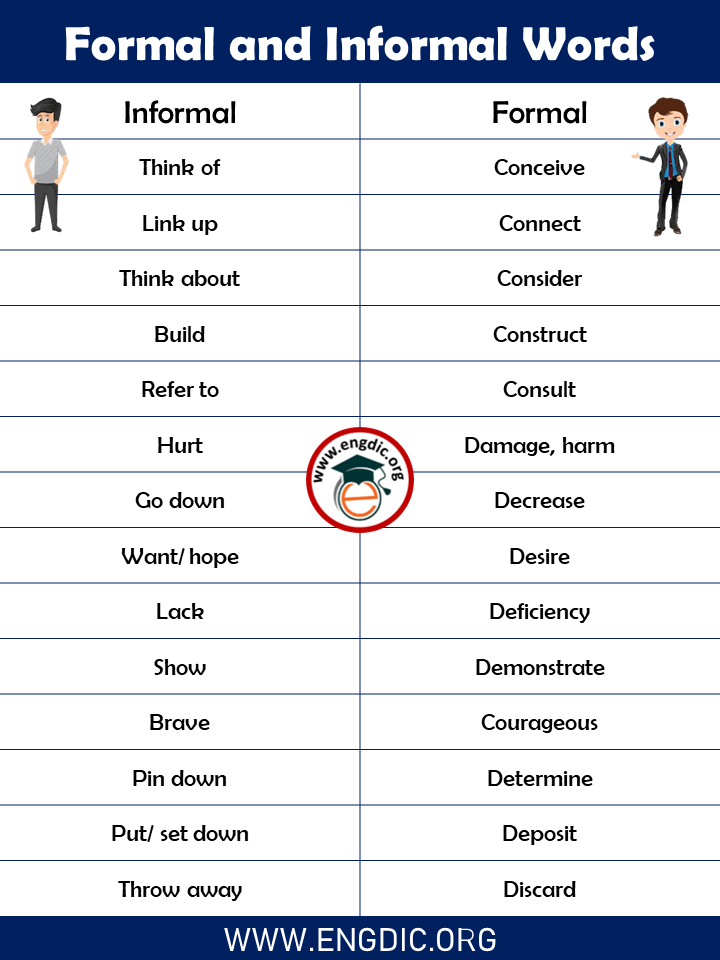Need is a semi-modal verb because in some ways it is like a modal verb and in other ways like a main verb.
We use need mostly in the negative form to indicate that there is no obligation or necessity to do something:
You needn’t take off your shoes.
Need: form
Affirmative form
Affirmatives with the semi-modal need are not common and they are used in formal contexts. There is almost always a negative word (e.g. no one, nobody, nothing) or phrase in the clause, even if the verb phrase is affirmative:
No one need think that we are doing this every week. (we are not doing this every week)
Nobody need know the name of the person who made the complaint.
Not a thing need change on this page.
Need comes first in the verb phrase (after the subject and before another verb):
Let’s forget about it. No one need know about it.
We can’t use another modal verb with need:
No one need read this.
Not: No one need must read this. or No one must need read this.
Negative form
Warning:
We form the negative by adding not after need. Need not can be contracted to needn’t. We don’t use don’t/doesn’t/didn’t with the semi-modal verb need:
You need not spend a lot of money on presents. (formal) (or You needn’t spend a lot of money on presents.)
Not: You don’t need spend a lot of money on presents.
Question form
The question form of the semi-modal need is not very common. It is rather formal. The subject and need change position to form questions. We don’t use do/does/did.
Need we write this down?
Not: Do we need write this down?
Need: use
No obligation (needn’t)
The semi-modal need is most common in the negative. We use it to show that there is no obligation:
We needn’t spend much time on this topic. It’s not going to be in the exam.
Cans of soup needn’t be kept in the fridge.
No obligation in the past
The semi-modal need has no past simple form. Instead, we use didn’t need to or didn’t have to when we express no obligation in the past:
I didn’t need to buy any books. They were all in the library. (main verb need + to)
(or I didn’t have to buy any books. They were all in the library.)
Not: I didn’t need buy any books. They were all in the library.
Unnecessary events
We use needn’t have + -ed form to refer to events which happened but which the speaker considers were unnecessary:
You needn’t have waited for me. (You waited for me but it wasn’t necessary.)
You needn’t have bought so much food. There are only three of us staying for the weekend. (You bought a lot of food but it wasn’t necessary.)
Semi-modal need and main verb need
We can use main verb need as an alternative to semi-modal need. Main verb need is followed by to and it changes with person, number and tense (I, you, we, they need to; she, he, it needs to; I, you, she, he, it, we, they needed to).
Compare
|
Semi-modal need |
Main verb need |
Comment |
|
|
In these examples, the meaning is the same for semi-modal need and main verb need + to. |
|
|
Warning:
We must use the main verb need when it is followed by a noun phrase or —ing clause:
You don’t need [noun phrase]an umbrella.
Not: You needn’t an umbrella.
My hair doesn’t need [-ing clause]cutting for at least another month.
Not: My hair needn’t cutting for at least another month.
Typical error
-
The main verb need is followed by to when used with another verb.
I need to have my hair cut.
Not: I need have my hair cut.
It’s important in English to use the correct preposition when we want to convey our meaning of a word. In this article, we’ll look at the difference between using “need of” and “need for” and when either of them is appropriate.
Is It “Need Of” Or “Need For”?
“Need of” should be used when someone is “in need” and is desperate to have something. It may also be used formally to mean “have need of,” though usually just “need” will suffice. “Need for” should be used when saying there is a “need” for something in particular to happen.
According to The Cambridge Dictionary, “need” means “to have to have something, or to want something very much.” We can use it to talk about possessions or something less tangible (like a “need for silence”).
Is “Need Of” Or “Need For” Used The Most?
Let’s go over which of the two phrases and prepositions is more commonly seen in English. With this information, you should start being able to figure out which is more common and why we say it.
According to this graph, “need for” is the most popular choice. That’s because there are more situations where “need for” is used in writing./ Generally, “need of” is only used in more specific situations (like being “in need of something”).
Whenever we come across two similar phrases, we can always look at the most popular written choice as the one that appears in more contexts. That usually means you’ll come across it yourself more often when you’re learning the language.
While we encourage you to learn both variations and what they mean, “need for” is clearer going to come up more frequently, so it’s more important to emphasize your learning of that to really get to understand it.
7 Examples Of How To Use “Need Of” In A Sentence
We find that examples are some of the most useful ways for us to teach you about new words and phrases. We’ll include some examples for both forms with the prepositions, and we’ll start with “need of.”
- I’m in need of some food if you have any spare.
- I’m in desperate need of money!
- I’m in need of new clothes but don’t have any money to buy them.
- We had need of shelter, and we were lucky to find it when we did.
- I’m in need of things that I’ve never had access to.
- Why is everyone in need of my time? I’m fully booked!
- I’m in need of a break. I hear there’s a nice spa not too far from here.
Usually, “need of” is followed by either “in” or “have.” When we use “in need of,” it means we don’t have something that we would really like to have (or we must have, depending on the urgency).
We use “have need of” in a more formal sense. It’s easier to replace it with just “need” as the verb in a more informal sense, but “have need of” means that there was a need for a particular thing to happen.
7 Examples Of How To Use “Need For” In A Sentence
Now let’s find out what makes “need for” so much more popular. It’s definitely going to come up more frequently, so pay close attention to these examples and what sets them apart from “need of.”
- There’s a need for balancing in these books before we end up bankrupt.
- We have a desperate need for equality.
- There’s a need for a change before the climate crisis spirals out of control.
- There is an urgent need for discipline in this school.
- I have no need for the things you’re offering me.
- I have no need for whatever it is you’re selling, so see you later!
- There’s a desperate need for more charitable donations here.
We typically use “need for” when we want to make a point that something is required of other people. Usually, it’s in reference to a place rather than a specific person, and we might be targeting a group of people when we’re talking about the “need.”
Usually, the words “a” or “an” will come before “need for” to emphasize the desperation of the word.
Need Of Or For – Synonyms
Synonyms and alternatives are a great way for you to explore your language knowledge and vocabulary. We’ll include a few examples of what you can use in place of “need of” and “need for.” Generally, these are seen as redundancies, and they can be shortened to the following:
- I (do not) need
This is the easiest way to shorten the phrase. It’s also the perfect synonym that means exactly the same as the two phrases. We can simply say “I need something” when we want to talk about having to have something.
- I require
“Require” is a verb that’s synonymous with “need.” That makes it another perfect example of a synonym that works to replace the waffle that is “in need of” or “a need for.”
What Is The Difference Between Needs And Wants?
Generally, we can group the words “needs” and “wants” together to roughly equate to things that people desire. However, there is an important distinction between the two.
“Needs” means that we desire something to the greatest extent or that we can’t possibly live without it. “Wants” means that we desire something without necessarily stating the extent. It shows a more general desire rather than an outright need.
Is It Ever Correct To Use “Needs Of” Or “Needs For”?
Whenever we use either of the phrases “needs of” or “needs for,” it’s important to look at situations where they might show up.
“Needs of” is correct when you want to use “the” before it to be more specific about the “needs.” “Needs for” is grammatically incorrect and is never used.
You can see what we mean about including “the” before “needs of” by looking at this famous saying:
- The needs of the many outweigh the needs of the few.
This is a great example of when “needs of” is used, though it’s much rarer to come across than “need of” in the singular sense.
Martin holds a Master’s degree in Finance and International Business. He has six years of experience in professional communication with clients, executives, and colleagues. Furthermore, he has teaching experience from Aarhus University. Martin has been featured as an expert in communication and teaching on Forbes and Shopify. Read more about Martin here.
B2 First: use of English part 3 (word formation with -ent and -ant)
Two common noun endings are -ance and -ence. Usually, their adjectives are made with -ant and -ent. Here are some common examples which might help you in the B2 First exam.
Look at the information in the tables for a few minutes and try to remember the words. Then click below to hide the information and try to answer the questions at the bottom.
| Noun (-ence) | Adjective | Verb |
|---|---|---|
| evidence | evident | — |
| existence | existing | to exist |
| (in)dependence | (in)dependent | to depend |
| difference | different | to differ |
| intelligence | intelligent | — |
| (dis)obedience | (dis)obedient | to (dis)obey |
| excellence | excellent | to excel |
| silence | silent | to silence |
| violence | violent | to violate |
| innocence | innocent | — |
| occurrence | — | to occur |
| (im)patience | (im)patient | — |
| Noun (-ance) | Adjective | Verb |
|---|---|---|
| attendance attendant (person) |
— | to attend |
| assistance assistant (person) |
— | to assist |
| (dis)appearance | apparent | to (dis)appear |
| distance | distant | — |
| (un)importance | (un)important | — |
| acceptance | accepting | accept |
| reassurance | reassured | to reassure |
| (ir)relevance | (ir)relevant | — |
| (in)significance | (in)significant | to signify |
Note: I have only given the more common word forms here. There are other forms but these are much less common (for example, it is possible to use «evidence something» as a verb).
Practice 1: word formation (use of English part 3)
Write the correct form of the word in brackets to complete these sentences. The answer could be a noun or an adjective. Don’t forget to use an -s or a negative prefix if necessary.
Practice 2: more word formation
Formal and Informal words list in English Pdf!
What are formal and informal Words?
Formal Language is like formal dress, in the formal language you have to be careful with words, and you have to choose words with respect. You cannot use the word ‘Ask’ in formal language because it is an informal word. You have to be a bit polite in formal language and vocabulary words, rather you can use ‘Inquire’ which is more formal than ‘ask’.
Informal Language is the language you speak with your friend’s circle. It is used in conversation with your family and friends, informal words are also respectful words, but they are less polite as compared to formal words.
Related: List of Formal Words in English
Formal and Informal words list in English
Here is the list of common 1000 Formal and Informal Words:
Informal –> Formal
- Ask –> Enquire
- Ask for –> Request
- Book –> Reserve
- Check –> Verify
- Get –> Receive
- Help –> Assist
- Need –> Request
- Say sorry –> Apologies
- Start/ Begin –> Commence
- End –> Terminate/ Finish
- Try –> Endeavour
- Deal with –> Handle
- Tell –> Inform
- Wait for –> Await
- Fight –> Combat
- Use/Eat –> Consume
- Go –> Depart
- Tough –> Difficult
- Small –> Diminutive
- Explain –> Disclose
- Set out –> Display
- Throw out –> Eject
- Old –> Elderly
- Say –> Express
- Afraid –> Fearful
- In the end –> Finally
- Lucky –> Fortunate
- But –> However
- Wrong –> Incorrect
- Go up –> Increase
- Cheap –> Inexpensive
- At first –> Initially
- Mad –> Insane
- Bright/smart –> Intelligent
- Big/Large –> Enormous
- Right –> Correct
- A bit –> A little
- Away –> Absent
- Speed up –> Accelerate
- Okay, ok –> Acceptable
- Help –> Aid/ Assist
- Let –> Allow
- Call off –> Cancel
- Friendly –> Amiable
Formal Informal Words Image 1
- Expect –> Anticipate
- Seem –> Appear
- Climb –> Ascend
- Beat up –> Assault
- Fall out –> Quarrel
- Eager –> Avid
- Stop –> Cease
- Dare –> Challenge
- Kids –> Children
- Settle for –> Choose
- Round –> Circular
- Pick up –> Collect
- Think of –> Conceive
- Link up –> Connect
- Think about –> Consider
- Build –> Construct
- Refer to –> Consult
- Hurt –> Damage, harm
- Go down –> Decrease
- Want/ hope –> Desire
- Lack –> Deficiency
- Show –> Demonstrate
- Brave –> Courageous
- Pin down –> Determine
- Put/ set down –> Deposit
- Throw away –> Discard
- Make out –> Discern
- Talk about –> Discuss/consider
- Give out –> Distribute
- Give –> Donate
- Remove –> Eliminate
- Imagine –> Envisage
- Break out –> Erupt
- Get out –> Escape
- Avoid –> Evade
- Go through –> Examine
- Make up –> Fabricate
- Test –> Experiment
- Ease –> Facilitate
- Come after –> Follow
- Sick –> Ill
- Ask out –> Invite
- Go away –> Leave/ depart
- At once –> Immediately
- Free –> Liberate
- Deal with –> Manage
- Bad –> Negative
- Look into –> Investigate
- Chance –> Opportunity
- See –> Perceive
- Happy –> Pleased
- Give up –> Quit
- Older –> Senior
- Use –> Utilize
- Enough –> Sufficient
- End –> Terminate
- Empty –> Vacant
- Rich –> Wealthy
- Mend –> Repair
- Idea –> Notion
Formal Informal Words Image 2
- Mainly –> Principally
- See –> Observe
- Leave out –> Omit
- Go against –> Oppose
- Hungry –> Famished
- Childish –> Immature
- Maybe –> Perhaps
- Good –> Positive
- Give –> Provide
- Buy –> Purchase
- Say no –> Reject
- Free –> Release
- Look for –> Seek
- Choose –> Select
- Get by –> Survive
- So –> Therefore
- Put up with –> Tolerate
- Block –> Undermine
- Catch up –> Understand
- Sight –> Vision
- Young –> Youthful
- Get –> Obtain
- Need –> Require
- Pay back –> Repay
- Live –> Reside
- Point out –> Indicate
- Find out –> Learn/Discover
- Get away –> Elude
- Come in –> Enter
- Lively –> Energetic
- Clear –> Transparent
- Whole –> Entire/Complete
- Blow up –> Explode
- Break down –> Fail/Collapse
- Hopeless –> Futile
- Hit out at –> Criticise
- Tired –> Exhausted/ Fatigued
- Clothes –> Garment
- Go before –> Precede
- Thanks –> Gratitude
- Hurry –> Haste, hasten
- Funny –> Humorous, amusing
- Better –> Improved
- Dim –> Indistinct
- Worse –> Inferior
- Put in –> Insert
- Bring in –> Introduce
- Make up –> Invent
- Kidding –> Jesting
- Naked –> Nude
- Childish –> Infantile
- A lot of –> Numerous
- Stubborn –> Obstinate
- Danger –> Peril
- Put off –> Postpone
- Here –> Present
- Keep –> Preserve
- Go ahead –> Proceed
- Go after –> Pursue
- Anyways –> Nevertheless
- Let –> Permit
- Sweat –> Perspiration
- Look at –> Regard
- Laid back –> Relaxed
- Take out –> Remove
- Rack up –> Accumulate
- Over –> At an end
Informal Formal Words Image 3
- Good looking –> Attractive
- Good for –> Beneficial
- By –> By means of
- Lead to –> Cause
- Complex –> Convoluted
- Go out of –> Exit
- Death –> Demise
- Break off –> Suspend/adjourn
- Also –> In addition, additionally
- Wood –> Timber
- Describe –> Depict
- Go on –> Continue
- In charge of –> Responsible
- Enjoyment –> Gratification
- Dirty/ polluted –> Contaminated
- Again & again –> Repeatedly
- Marvelous –> Exceptional
- Really big –> Considerable
- Can –> Is capable of
- Fork out –> Pay (money)
- Talk into –> Persuade
- Come up to –> Reach/attain
- Iron out –> Solve/overcome
- Next/later –> Subsequently
- Try out –> Test
- Call on –> Visit
- Drop out of –> Withdraw (from)
- Look up to –> Respect
- Look like –> Resemble
- Job –> Occupation
- Dad –> Father
- Boss –> Employer
- Avoid –> Evade
- Also In –> Addition,
- Ask –> Enquire
- Afraid –> Fearful
- At First –> Initially
- Ask For –> Request
- Again & Again –> Repeatedly
- A Bit –> A Little
- Avoid –> Evade
- Anyway –> Nevertheless
- Ask Out –> Invite
- Away –> Absent
- At Once –> Immediately
- A Lot Of –> Numerous
Informal Formal Vocabulary Image 4
- Bright/smart –> Intelligent
- Buy –> Purchase
- Build –> Construct
- But –> However
- Bad –> Negative
- Beat up –> Assault
- Break out –> Erupt
- Block –> Undermine
- Blow up –> Explode
- Boss –> Employer
- Brave –> Courageous
- Better –> Improved
- Big/Large –> Enormous
- Bring in –> Introduce
- Break off –> Suspend/adjourn
- Break down –> Fail/Collapse
- Check –> Verify
- Come after –> Follow
- Choose –> Select
- Clear –> Transparent
- Come in –> Enter
- Call off –> Cancel
- Complex –> Convoluted
- Call on –> Visit
- Childish –> Infantile
- Chance –> Opportunity
- Cheap –> Inexpensive
- Can Is –> capable of
- Come up –> to Reach/attain
- Climb –> Ascend
- Clothes –> Garment
- Dirty/ polluted –> Contaminated
- Danger –> Peril
- Dare –> Challenge
- Dad –> Father
- Describe –> Depict
- Deal with –> Handle
- Dim –> Indistinct
- Death –> Demise
- Deal –> with Manage
- Drop out –> of Withdraw (from)
- End –> Terminate/ Finish
- Ease –> Facilitate
- Eager –> Avid
- Expect –> Anticipate
- Enough –> Sufficient
- Explain –> Disclose
- End –> Terminate
- Empty –> Vacant
- Enjoyment –> Gratification
Formal Informal Words Image 5
- friendly –> Amiable
- Free –> Liberate
- Fork out –> Pay (money)
- Fall out –> Quarrel
- Fight –> Combat
- Get –> Receive
- Get out –> Escape
- Go –> Depart
- Go before –> Precede
- Go after –> Pursue
- Good looking –> Attractive
- Give –> Donate
- Go down –> Decrease
- Go through –> Examine
- Good for –> Beneficial
- Go ahead –> Proceed
- Go up –> Increase
- Go on –> Continue
- Go out of –> Exit
- Give up –> Quit
- Get away –> Elude
- Go away –> Leave/ depart
- Give out –> Distribute
- Go against –> Oppose
- Get –> Obtain
- Good –> Positive
- Get by –> Survive
Related: Formal and Informal Words List for IELTS
- Hit out at –> Criticise
- Hungry –> Famished
- Here –> Present
- Help –> Assist
- Hopeless –> Futile
- Happy –> Pleased
- Hurry –> Haste, hasten
- Hurt –> Damage
- Idea –> Notion
- Imagine –> Envisage
- In charge of –> Responsible
- Iron out –> Solve/overcome
- Job –> Occupation
- Keep –> Preserve
- Kidding –> Jesting
- Kids –> Children
- Look up to –> Respect
- Look at –> Regard
- Lucky –> Fortunate
- Lead to –> Cause
- Let –> Allow
- Lucky –> Fortunate
- Lack –> Deficiency
- Look for –> Seek
- Let –> Permit
- Live –> Reside
- Leave out –> Omit
- Look like –> Resemble
- Lively –> Energetic
- Laid back –> Relaxed
- Live –> Reside
- Look into –> Investigate
- Make up –> Fabricate
- Mainly –> Principally
- Mad –> Insane
- Maybe –> Perhaps
- Mend –> Repair
- Marvelous –> Exceptional
- Need –> Require
- Naked –> Nude
- Next/later –> Subsequently
- Old –> Elderly
- Over At an –> end
- Okay, ok –> Acceptable
- Older –> Senior
- Put off –> Postpone
- Pay back –> Repay
- Put/ set down –> Deposit
- Pin down –> Determine
- Put in –> Insert
- Pick up –> Collect
- Put up with –> Tolerate
- Point out –> Indicate
Related: Formal and Informal Vocabulary Examples
Informal Formal Vocabulary Image 6
- Really big –> Considerable
- Remove –> Eliminate
- Rack up –> Accumulate
- Refer to –> Consult
- Rich –> Wealthy
- Round –> Circular
- Right –> Correct
- Show –> Demonstrate
- Speed up –> Accelerate
- Stop –> Cease
- Set up –> Establish
- Sick –> ill
- Stubborn –> Obstinate
- Start/ Begin –> Commence
- Shorten –> Decrease
- Settle for –> Choose
- Say no –> Reject
- Small –> Diminutive
- See –> Observe
- So –> Therefore
- Sight –> Vision
- Seem –> Appear
- Set out –> Display
- Seem –> Appear
- Sweat –> Perspiration
- Say sorry –> Apologise
- Say –> Express
- Talk into –> Persuade
- Tired –> Exhausted/ Fatigued
- Throw away –> Discard
- Take out –> Remove
- Test –> Experiment
- Thanks –> Gratitude
- Tough –> Difficult
- Try out –> Test
- Talk about –> Discuss/consider
- Throw –> out Eject
- Think of –> Conceive
- Try –> Endeavour
- Think about –> Consider
- Tell –> Inform
- Use –> Utilize
- Wood –> Timber
- Want/ hope –> Desire
- Wrong –> Incorrect
- Wait for –> Await
- Want –> Desire
- Worse –> Inferior
- Whole –> Entire/Complete
- Young –> Youthful
Must Learn: 200 synonyms words list
Infographics (Formal and Informal words list in English )


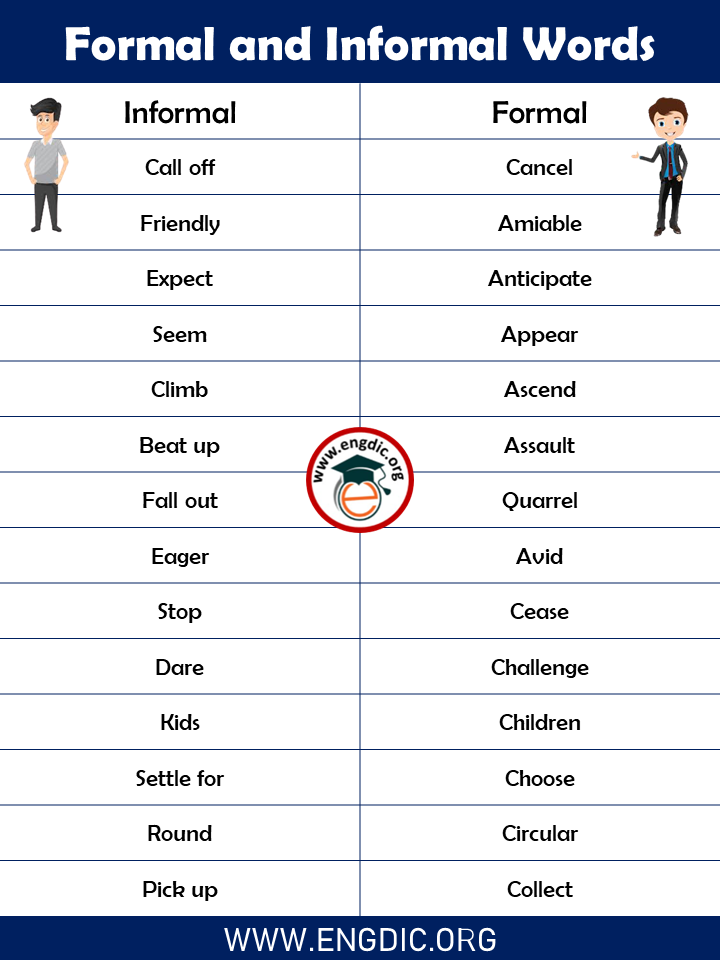
Download this lesson on Formal and Informal words list in English in PDF
Download PDF
About The Author
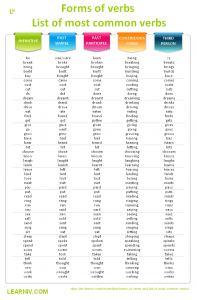
In English, there are just five most common forms of verbs:
- Infinitive (the base form)
- Past tense
- Past participle
- The continuous form (the -ing form)
- Third person (the -s form)
There may also be many other forms, for example different grammatical persons of ‘to be’ – am, is, are… (for more details read this Wikipedia article) but these five are the most commonly produced.
So far, so good? Now, you can combine these five forms to create more complex grammar structures. The five forms are like the building blocks of any higher unit, so the good news is, if you learn these, you’re good to start working on your intermediate or even advanced English.
Typically, you can use the forms in combination with others to put verbs into twelve tenses:
- Present Simple
- Present Continuous
- Past Simple
- Past Continuous
- Present Perfect
- Present Perfect Continuous
- Past Perfect
- Past Perfect Continuous
- Future
- Future Continuous
- Future Perfect
- Future Perfect Continuous
Let’s have a look how, taking the verb Listen as an example:
| Infinitive | Past simple | Past participle | Continuous form | Third person |
| Listen | Listened | Listened | Listening | Listens |
And here’s how to put the verb Listen into the first person in all those twelve tenses:
- Present Simple – I listen
- Present Continuous – I am listening
- Past Simple – I listened
- Past continuous – I was listening
- Present perfect – I have listened
- Present Perfect Continuous – I have been listening
- Past Perfect – I had listened
- Past Perfect Continuous – I had been listening
- Future – I will listen
- Future Continuous – I will be listening
- Future Perfect – I will have listened
- Future Perfect Continuous – I will have been listening
Regular and irregular forms of verbs
English verbs are either regular or irregular. Regular verbs are much easier to work with because they take the -ed ending, which is identical both for the past form and the past participle, and that’s it.
Here’s an example, still using Listen:
- He listened
English irregular verbs are a different story, though. This is where it starts to get tricky and you have to memorize them, especially the past simple and past participle forms, although there are certain patterns to make things easier. They are sometimes called families, where all the verbs in a family follow the same pattern, e.g.:
- bring – brought – brought
- buy – bought – bought
- think – thought – thought
or
- put – put – put
- cut – cut – cut
- let – let – let
Third person
But the simplest category of all the different verb forms is probably the third-person singular, also known as the -s form (yes, that is the -s that we all forget to add to the end of the verb when we talk about he/she!). We say it’s quite simple because all you need to do to put a verb in the third-person singular is to add ‘s’ or ‘es’ to the end, e.g.:
- He listens
- She works
- It plays
And it’s the same both for regular and irregular verbs. No exceptions!
Well… except for modal verbs (e.g. can, may, should…). But life wouldn’t be so beautiful if it was too easy. If you want to know everything about the third person, you can read a more detailed article about here.
And finally, here are the top 50 irregular verbs in all their five forms (PDF file):
| Infinitive | Past simple | Past Participle | Continuous form | Third person |
|---|---|---|---|---|
| be | was/were | been | being | is |
| break | broke | broken | breaking | breaks |
| bring | brought | brought | bringing | brings |
| build | built | built | building | builds |
| buy | bought | bought | buying | buys |
| come | came | come | coming | comes |
| cost | cost | cost | costing | costs |
| cut | cut | cut | cutting | cuts |
| do | did | done | doing | does |
| dream | dreamt | dreamt | dreaming | dreams |
| drink | drank | drunk | drinking | drinks |
| drive | drove | driven | driving | drives |
| eat | ate | eaten | eating | eats |
| find | found | found | finding | finds |
| get | got | gotten | getting | gets |
| give | gave | given | giving | gives |
| go | went | gone | going | goes |
| grow | grew | grew | growing | grows |
| have | had | had | having | has |
| hear | heard | heard | hearing | hears |
| hit | hit | hit | hitting | hits |
| choose | chose | chosen | choosing | chooses |
| know | knew | known | knowing | knows |
| laugh | laught | laught | laughing | laughs |
| learn | learnt | learnt | learning | learns |
| leave | left | left | leaving | leaves |
| lend | lent | lent | lending | lends |
| lose | lost | lost | losing | loses |
| meet | met | met | meeting | meets |
| pay | paid | paid | paying | pays |
| put | put | put | putting | puts |
| read | read | read | reading | reads |
| ring | rang | rung | ringing | rings |
| run | ran | run | running | runs |
| say | said | said | saying | says |
| see | saw | seen | seeing | sees |
| sell | sold | sold | selling | sells |
| send | sent | sent | sending | sends |
| sing | sang | sung | singing | sings |
| sit | sat | sat | sitting | sits |
| sleep | slept | slept | sleeping | sleeps |
| speak | spoke | spoken | speaking | speaks |
| spend | spent | spent | spending | spends |
| swim | swam | swum | swimming | swims |
| take | took | taken | taking | takes |
| tell | told | told | telling | tells |
| think | thought | thought | thinking | thinks |
| win | won | won | winning | wins |
| work | wrought | wrought | working | works |
| write | wrote | written | writing | writes |
You may be also interested in:
-
- Complete list of irregular verbs (there are over 600 of them!)
- Top 25 of irregular verbs
- Top 50 of irregular verbs
- Most common words in english
In English grammar, we might use the contracted form of a verb when we are speaking or writing informally.
Let’s look at a list of contracted forms of verbs (with their expanded form) so you know how to use them:

What is the contracted form of a verb?
A contraction is a shortened form of a verb that is used when two words are combined to form one.
This involves removing one or more letters and adding an apostrophe to create a new word. For example, “I am” becomes “I’m.”
When are contracted forms used?
Contracted forms are used frequently in everyday spoken language and informal written language, such as e-mails and text messages.
They cannot be used in formal, academic writing, or professional documents where each word needs to be spelled out completely.
The following is a list of common contracted forms of verbs:
- I am – I’m
- I am not – I ain’t
- Let us – Let’s
- I will – I’ll
- We will – We’ll
- I would – I’d
- We are – We’re
- You will – You’ll
- You would – You’d
- He is – He’s
- She is – She’s
- It is – It’s
- She has – She’s
- He has – He’s
- It has – It’s
- We have – We’ve
- They have – They’ve
- Where is – Where’s
- Who is – Who’s
- There is – There’s
- They are – They’re
- They will – They’ll
- Might have – Might’ve
- Must have – must’ve
Negative Common Contractions
- Is not – Isn’t
- Are not – Aren’t
- Can not – Can’t
- Was not – Wasn’t
- Could not – Couldn’t
- Did not – Didn’t
- Have not – Haven’t
- Had not – Hadn’t
- Has not – Hasn’t
- Should not – Shouldn’t
- Would not – Wouldn’t
- Were not – Weren’t
- Will not – Won’t
While contracted forms of verbs are usually informal in nature, it is always best to use the full form in a formal context.
Contractions With The Verb HAVE
Here are some shortened forms of the verb “have.”
- I have – I’ve
- You have – You’ve
- He has – He’s
- She has – She’s
- It has – It’s
- We have – We’ve
- They have – They’ve
- I have not – I haven’t – I’ve not
- You have not – You haven’t – You’ve not
- He has not – He hasn’t – He’s not
- She has not – She hasn’t – She’s not
- It has not – It hasn’t – It’s not
- We have not got – We haven’t – We’ve not
- They have not got – They haven’t – they’ve not
The contracted form “haven’t” is more common than the contraction with not. However, this may vary depending on the region you are living.
Example sentences:
We have not met. We’ve not met (less common). We haven’t met (more common).
Contractions With The Verb HAVE (Past Form)
- I had – I’d
- You had – You’d
- He had – He’d
- She had – She’d
- It had – It’d
- We had – We’d
- They had – They’d
- I had not – I hadn’t – I’d not
- You had not – You hadn’t – You’d not
- He had not – He hadn’t – He’d Not
- She had not – She hadn’t – She’d Not
- It had not – It hadn’t – It’d Not
- We had not – We hadn’t – We’d Not
- They had not – They hadn’t – They’d Not
In American English, instead of saying:
“I have a new toy” they prefer to say, “I’ve got a new toy.” This is informal. However, “I’ve a new toy” is also correct; it’s just less common.
However, “has” can never be contracted when it’s the main verb in the sentence and in the third person present tense (he, she, it).
For example:
- She has food.
“She’s food.” This is incorrect. Instead, we can say, “She’s got food”
- He has a bicycle.
“He’s a bicycle.” This is incorrect. Instead, we can say, “He’s got a new bicycle.”
However, if “have” is the auxiliary (helping) verb, then we can contract the verb:
- He has arrived.
“He’s arrived.” This is correct, as the main verb is “arrive” and not have.
- It has snowed.
“It’s snowed.” This is correct as the main verb is “snow” and not have.
Contractions With The Verb BE
- I am – I’m
- You are – You’re
- He is – He’s
- She is – She’s
- It is – It’s
- We are – We’re
- They are – They’re
- There is – There’s
- How is – How’s
- What is – What’s
- Where is – Where’s
- Here is – Here’s
- You are not – you aren’t – you’re not
- He is not – he isn’t – he’s not
- She is not – she isn’t – she’s not
- It is not – it isn’t – it’s not
- We are not – we aren’t – we’re not
- They are not – they aren’t – they’re not
The contracted form “isn’t/aren’t” and “not” are used interchangeably and you will hear both said.
If you want to emphasize that you are not involved in something, you might be more inclined to use the “not” contracted form when speaking, although either contracted form is perfectly fine.
For example, “she’s not a liar.”
Contractions with the Verb BE (Past Form)
- I was not – I wasn’t
- You were not – You weren’t
- He was not – he wasn’t
- She was not – she wasn’t
- It was not – it wasn’t
- We were not – we weren’t
- They were not – they weren’t
You can also use the contracted form with a noun, for example, “the dog’s on the sofa” (the dog is on the sofa) and “Alice’s here” (Alice is here).
Again this is informal and is more common when speaking.
Contractions with the verb DO
- I do not – I don’t
- You do not – You don’t
- He does not – He doesn’t
- She does not – She doesn’t
- We do not – We don’t
- They do not – They don’t
Contractions with the Verb DO (Past Form)
- I did not – I didn’t
- You did not – You didn’t
- He did not – He didn’t
- She did not – She didn’t
- It did not – It didn’t
- We did not – We didn’t
- They did not – They didn’t
Contractions With The Modal Verb WILL
- I will – I’ll
- He will – He’ll
- She will – She’ll
- It will – It’ll
- We will – We’ll
- They will – They’ll
- I will not – I won’t – I’ll not
- He will not – He won’t – He’ll not
- She will not – She won’t – She’ll not
- It will not – It won’t – It’ll not
- We will not – We won’t – We’ll not
- They will not – They won’t – They’ll not
Nowadays, most people say “won’t” instead of “not.
For example,
- “I’ll not go to the dance.” (old-fashioned; not common)
- I won’t go to the dance.” (more common)
Contractions with the modal verb WOULD
- I would – I’d
- He would – He’d
- She would – She’d
- It would – It’d
- We would – We’d
- They would – They’d
- I would not – I wouldn’t – I’d not
- He would not – He wouldn’t – He’d not
- She would not- She wouldn’t- She’d not
- It would not – It wouldn’t – It’d not
- We would not – We wouldn’t – We’d not
- They would not – They’d not- They’d not
“I’d not” is grammatically correct but sounds odd to native English speakers as it is not used. It is most more common to say I wouldn’t, he wouldn’t, she wouldn’t, etc.
Contractions with the modal verb WOULD (Past Form)
- I would have – I would’ve – I’d have
- You would have – You would’ve – You’d have
- He would have – He would’ve – He’d have
- She would have – She would’ve – She’d have
- It would have – It would’ve – It’d have
- We would have – We would’ve – We’d have
- They would have- They would’ve – They’d have
- I would not have – I wouldn’t have- I’d not have
- He would not have – He wouldn’t have- He’d not have
- She would not have – She wouldn’t have- She’d not have
- It would not have – It wouldn’t have- It’d not have
- We would not have – We wouldn’t have- We’d not have
- They would not have – They would’ve – They’d not have
“I’d not have” is grammatically correct but sounds strange to native English speakers as it is not spoken. It is most more common to say I wouldn’t have, he wouldn’t have, she wouldn’t have, etc.
Short Forms of Other Modal Verbs
The modals can, may, must, should, and can also be contracted when used as auxiliaries. For example, “He can’t do it,” “She shouldn’t have come,” and “I wouldn’t have done it.”
- Cannot – Can’t
- Can Not Have – Can’t’ve
- Must not – Mustn’t
- Must not have – Mustn’t’ve
- Should not- Shouldn’t
- Should not have – Shouldn’t’ve
- Shall not – Shan’t
- Shall not have – Shalln’t’ve
- Used not – Usen’t – Usedn’t
- Could not – Couldn’t
- Could not have – Couldn’t’ve
- Might not – Mightn’t
- Might not have – Mightn’t’ve
- Ought not to – Oughtn’t to
- Ought not have – Oughtn’t’ve
- Need not – Needn’t
- Need not have – Needn’t’ve
- Will not – Won’t
- Will not have – Won’t’ve
- Dare not – Daren’t
- Dare not have – Daren’t’ve
- Had Not – Hadn’t
Some of the contractions are rare and awkward, like “oughtn’t’ve” and “usedn’t.”
In Conclusion
The contracted forms of verbs are informal and are used more commonly in speech.
It is good to know them in case you hear them in spoken English, and their usage varies depending on the region.
I’m an Irish tutor and founder of TPR Teaching. I started teaching in 2016 and have since taught in the UK, Spain, and online.
I love learning new things about the English language and how to teach it better. I’m always trying to improve my knowledge, so I can better meet the needs of others!
I enjoy traveling, nature walks, and soaking up a new culture. Please share the posts if you find them helpful!

This is the second of three chapters about Word Forms. To complete this reader, read each chapter carefully and then unlock and complete our materials to check your understanding.
– Introduce the four word classes relevant to word forms
– Provide examples of useful suffixes for each word class
– Use example sentences to help guide the learner
Before you begin reading…
This topic now has an interactive unit:
Suffixes and Word Families
-
video and audio texts -
knowledge checks and quizzes -
skills practices, tasks and assignments
Chapter 2
Now that we’ve discussed what word forms and word families are and why learning about these topics is important, the next step to word-form proficiency is to understand how to use and recognise the four lexical word classes, which are adjectives, adverbs, nouns and verbs. This chapter deals with this topic precisely, highlighting exactly when such word classes may be needed and which suffixes are most commonly used to form them. If you can first recognise which word class you need to use, you can then select the appropriate suffix to form that word correctly.
1. Adjectives
There are some simple rules that can be followed to determine which word form you need to use in a sentence, and for adjectives this means understanding adjectival distribution. As you may already know, adjectives modify nouns, and as such they may often be found either before the noun or directly after the ‘be’ verb.

Another way of helping you determine whether you have or require an adjective is to memorise the particular suffixes that are common to this word class. While the following table offers seven of the most common adjectival suffixes, there are still more to watch out for:
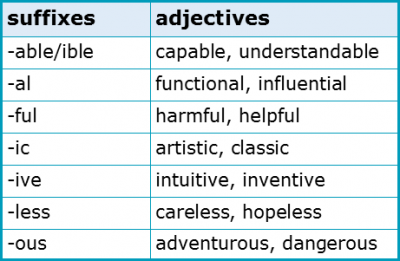
2. Adverbs
While adjectives may modify the noun, adverbs unsurprisingly modify the verb. Such adverbs may come before or after the verb they modify and are usually formed using the ‘-ly’ suffix, as is shown in the two examples below.

However, it’s not always the case that adverbs are formed using ‘-ly’. In fact, some adjectives such as ‘likely’ may use this suffix too, so do be careful here. Unlike adjectives though, there are not so many possible suffixes available to adverbs, and so recognising this word class should be somewhat easier.

3. Nouns
Nouns are the most common word class you’ll use, particularly in academic writing. Thankfully, nouns are easy enough to recognise because they act as the subjects or objects of a sentence, such as in the following two examples:

Much like adjectives, nouns also have a number of common suffixes that a student should learn to recognise. The following table outlines the seven most common:
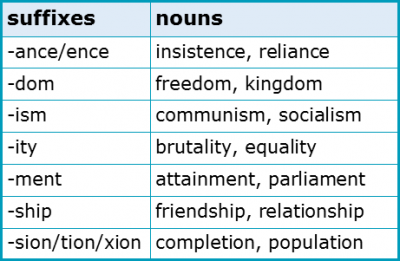
4. Verbs
Verbs are the final word class that you’ll need to watch out for when correctly forming your vocabulary. Verbs indicate what a subject does, feels or believes, and they tend to come immediately after that subject in English (which is a subject-verb-object language) and before any optional or required objects.

What also makes verbs easy to recognise is that this word class may be inflected for person, tense or aspect. The table below shows how the regular verb ‘claim’ may be formed in a variety of ways:
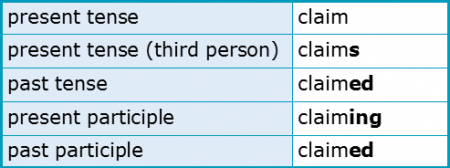
Clearly then, regular verbs such as ‘claim’ follow the simple pattern shown below:
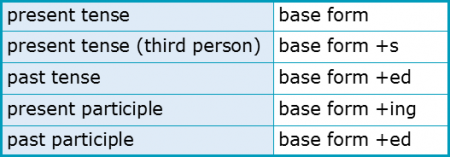
While these formation patterns may make verbs easy to recognise, such variation also makes this word class more difficult to form correctly. This is particularly true of the English language which has many irregular verbs that refuse to follow the standard patterns, two examples of which are shown below:

The rules provided in this chapter for the distribution of the four lexical word classes should help you to know precisely when to change a word form to improve the grammar of a sentence. The final chapter on this topic however, Chapter 3, then deals with memorising the word families for the most common academic words.
2 of 3 Chapters Completed
Downloadables
Once you’ve completed all three chapters about word forms, you might also wish to download our beginner, intermediate and advanced worksheets to test your progress or print for your students. These professional PDF worksheets can be easily accessed for only a few Academic Marks.
Gain unlimited access to our word forms beginner worksheet, with activities and answer keys designed to check a basic understanding of this reader’s chapters.
To check a confident understanding of this reader’s chapters, click on the button below to download our word forms intermediate worksheet with activities and answer keys.
Our word forms advanced worksheet with activities and answer keys has been created to check a sophisticated understanding of this reader’s chapters.
To save yourself 5 Marks, click on the button below to gain unlimited access to all of our word forms chapters and worksheets. The All-in-1 Pack includes every chapter on this topic, as well as our beginner, intermediate and advanced worksheets in one handy PDF.
Click on the button below to gain unlimited access to our word forms teacher’s PowerPoint, which should include everything you’d need to successfully introduce this topic.
Looking for live support?
Our tutors are here to help! Academic Marker has three centres of teaching excellence that support and supplement our e-learning pathways, offering private and group services to suit all educational budgets. Enrol today and receive a 10% discount on tailored tuition, group workshops, study programmes and materials development 🎁
Collect Academic Marks
🎁 Free
to join the community
-
25 Marks for joining -
7 Marks for daily e-learning -
20-30 for feedback and testimonials -
20-100 for referring others

